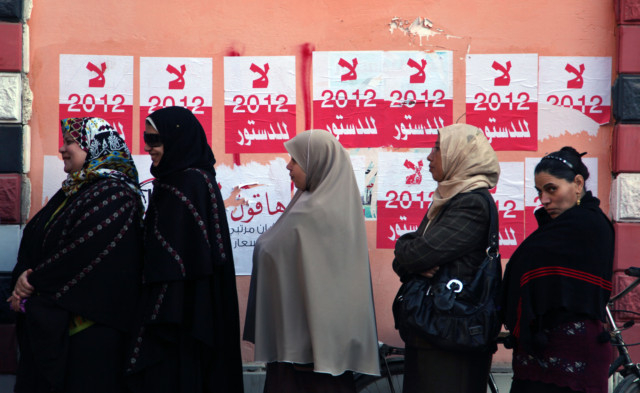
Egyptians’ battle over the constitution may be over, but the reverberations are going to stay for long. The referendum on the divisive draft document, regardless of claimed irregularities, was a victory for the Muslim Brotherhood, but not necessarily for the whole of Egyptian people. Even two-thirds “yes” votes, out of a turnout of less than a third of those eligible to vote (more than 50 million of Egypt’s 85 million populations), is not the consensus required for a lasting constitution. With around a quarter of the electorate deciding for the whole nation, it is far from being inclusive. The impact might not be on the stability promised by the parties that fast-tracked its approval. The Islamists dealt with the constitutional referendum as an electoral victory, giving them a wider mandate to change Egypt. Egyptians, who ousted Hosni Mubarak, may not make it easy for the Muslim Brotherhood to shape the society the way they like.
The battle for the constitution in Egypt was not what it seemed — a step on the road to re-build the country into a modern democracy after decades of dictatorship. Rather, it is another step on the bumpy road of transition. Despite all the turmoil — sometimes tainted with violence and blood, and the divisions — the outcome is positive. Egyptians are proving that change in their country and the region is genuine and will ultimately reshape the future — probably of the whole world. Muslim Brotherhood hastened the process of passing the divisive document not to gain consensus and start rebuilding, but mainly to strengthen their hold on the country as they know that their claim to a popular legacy is not sweeping and not enough for a mandate to fully ‘Islamise’ the country. That is why the lengthy document was kept open-ended, thereby allowing many interpretations, handing groups like the Brotherhood the tool to change the country and its social and administrative structure.
Political factions who opposed the draft, led by Nobel laureate Mohammad Al Baradei, were more concerned about the drafting process as it was not inclusive of all Egyptians’ aspirations. So, the draft itself was obsolete because of the way it was produced. Unfortunately, more representation was not guaranteed to produce a more inclusive document. The draft was written by a group, though dominated by Islamists, representing the state of Egyptian intelligentsia of the Mubarak era. That is why the draft did not come as a surprise, as the country has been deemed intellectually and culturally depleted. It actually reveals the level of deterioration the country has seen in the last four decades. Most of the lengthy draft items, rhetorically written in a pompous language, are either regulatory or they detail rules, but do not come through as a long-lasting social contract.
Whether such a constitution provides the required legitimacy to the Brotherhood and its rule is open for questioning. In reality, one of the significant outcomes of the ‘battle’ over the constitution is the questioning of the Islamists’ legacy by many Egyptians (almost half the society). Since the election of President Mohammad Mursi last summer, the practises of the current regime over the last few months in power made many rethink the notion that the Brotherhood and their affiliates possessed the ultimate ‘cure’ to the country’s ills.
The western media wants to buy the notion of “oppressed Islamists should be given the chance, as the people of the region elected them”. But that is a sort of hypocrisy and a continuation of an ‘Orientalist’ attitude as dissected by Edward Said. Politicians think — perhaps rightly — that Islamists are the only organised political power in many countries of the region that can protect western interests in a better way, even better than defunct old regimes. If autocracies, backed by the military, ran out of steam then it is only regimes with religious legacy that can make their people swallow what is not in their interest.
The Brotherhood is playing on that western support, almost like Israeli pressure through emphasis on the ‘guilt factor’. It also presents itself as the one that controls the hearts and minds of the masses — as religion plays an important role in the life of Egyptians and the people of the region — and can do whatever is needed with no serious opposition.
Egyptians are bound to prove that people of the region are not that ‘different’ from the rest of humanity and can lead a better life out of the current chaos. They will ultimately prove the failure of Islamists in politics and that will be the end of the Muslim Brotherhood — not only in Egypt, but in the entire region. History, and the latest awakening inspired by the uprising last year, supports this assumption.
The battle for the constitution was a twisted step in Egypt’s course for change, but a forward one anyway. That document can easily be rewritten once people regain their will out of the so-called ‘religious’ rule.
Dr Ayman Mustafa is a London-based Arab writer.







